-
Title
-
Poetry of the Negro, 1746-1949: An Anthology
-
This edition
-
"The Poetry of the Negro, 1746-1949: An Anthology" . Ed. Arna Bontemps and Langston Hughes. Garden City, NY: Doubleday, 1949. xviii+429 pp.
-
Other editions, reprints, and translations
-
• Repr. Garden City, NY: Doubleday, 1951.
Translations:
• Japanese: "The Poetry of the Negro". Ed. Langston Hughes and Arna Bontemps. Tokyo: Mirai-sha Press, 1952. 158 pp. (Introduction by Hughes, according to James A. Emanuel and Theodore L. Gross, ed. "Dark Symphony: Negro Literture in America". New York: Free Press, 1968. 197.)
-
Revised edition:
• "The Poetry of the Negro, 1746-1970". Ed. Langston Hughes and Arna Bontemps. Rev. ed. Garden City, NY: Doubleday, 1970. xxiv+645 pp.
-
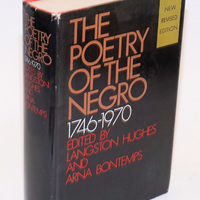 The Poetry of the Negro, 1746-1970 (rev. ed.)
The Poetry of the Negro, 1746-1970 (rev. ed.)
-
Online access
-
1951 Doubleday printing is available via Internet Archive:
-
Internet Archive
-
Table of contents
-
Contents (1949 ed.):
Negro poets of the U.S.A.--Tributary poems by non-Negroes.--The Caribbean.--Biographical notes.
-
About the anthology
-
• "An anthology of black American poetry from Lucy Terry and Jupiter Hammon to David Henderson and Julian Bond—numerous minor as well as major poets. Also includes white writers on black people. Bio-bibliographical sketches (pp. 591-626) on black and white poets" (Rowell 1972: 56).
-
Reviews and notices of anthology
-
• "Kirkus Reviews" 16 (10 Jan. 1948 [or 15 Nov. 1948?]): 609.
"The volume edited by Hughes and Bontemps is a timely anthology, including not only Negro verse but verse written about the Negro. Beginning with the earliest pieces written by slaves still in captivity, the first section is devoted entirely to American Negroes, down to contemporaries. The second section deals with work by non-Negroes, such as Blake, Whitman, Lindsay and others. The third section, while keeping to the Negro theme, has wide range, bracketed only by the geographical limitations of the title,- The Caribbean. The purpose of the book is competently served- to survey the field of both Negro poetic expression, and the poetry he inspired in others."
-
Kirkus Reviews
-
• "New York Herald Tribune" 16 Jan. 1949: 17.
-
• Creekmore, Hubert. "Two Rewarding Volumes of Verse." "New York Times" 30 Jan. 1949.
"In a brief preface the anthology is defined: "The common thread . . . is the Negro's experience in the Western world." Thus it includes not only United States Negro poets but Negro poets from Caribbean countries; and not only poems by Negroes but "tributary" poems by non-Negroes. This seems quite sound, except that there are no folksongs (spirituals, blues, jubilees) and no explanation of why they are omitted. For them, many readers would gladly sacrifice those spacious and fussy tributary poems. In all the writers gathered here (from the eighteenth century to the present), hardly any echo of Eliot, Auden, Hopkins or Surrealism. Most of them have modeled on native American traditions, which Negroes themselves developed a century ago or on familiar lyric forms. Textually, the early poets show the same Victorian and Georgian influence that suffuses most other American poets of the period. And though the collection as a whole gives an impression of a rather limited thematic scope--love, nature, racial problem--it proves on examination to be a deceptive one. The new poets of the Forties leave no doubt that they are broadening and deepening their material and technique. The anthology is a stimulating cross-section of the imaginative writing of the Negro. It can help the reader understand the Negro's emotions, longings and values. And it demonstrates the thoughtful development of Negro talent to the point where one questions the necessity (other than for its social evidence) of the specialization of "Negro" in the title." [full text of review of this anthology]
-
New York Times
-
• Nims, John Frederick. "Inclusive Anthology of Negro Poetry." "Chicago Tribune" 30 Jan. 1949: B4.
-
• Humphries, Rolfe. "Negro Verse." "The Nation" 19 Feb. 1949: 217.
-
• "Tiger's Eye" 15 March 1949.
-
• Untermeyer, Jean Starr. "Anthology of and about a Race." "Saturday Review" 19 March 1949: 16.
-
Unz.com
-
• Cullum, Robert M. "The Common Basis of Humanity." "Common Ground" (Summer 1949): 107-08.
-
Unz.com
-
• Lovell, John, Jr. (Associate Prof. of English, Howard Univ.). "Where Has Poetry Gone?" Rev. of "The Poetry of the Negro 1746-1949", ed. Langston Hughes and Arna Bontemps. "Journal of Negro Education" 19.1 (Winter 1950): 66-68. "JSTOR".
"To read "The Poetry of the Negro", this new anthology by Langston Hughes and Arna Bontemps, is to get here and there a titillating sensation; to think about it, and its publication date (1949) and spread of years (two hundred) is to feel greatly depressed and discouraged. Is poetry all over and done with? Was T. K. Whipple telling the truth when he said in "Study Out the Land" that very modernly the functions of the poet // had been taken over by the engineer, for example? Or is it just Negroes who have outgrown written poetry?
"Whatever poetry is—and you can define it in a million ways—it is "powerful" stuff. It is not just a casual or even a thoughtful set of words tossed off by some very smart person gifted with clever phraseology, or by some insomniac, or even by a bright adolescent who thinks he's in love. As Dr. Whipple said, it is magic, produced as such, intended as such. It is manufactured to stir, to elevate, to inspire the people.
"Since that is true, Messrs. Hughes and Bontemps would have spent their time far more profitably if they had made an anthology say of one-tenth or one-twentieth this size containing the really powerful things in their present volume. But since they did not, let us see what is to be learned from so vast and arid a collection.
"First, it is necessary to explain their principle of organization. They have re-presented the 'standard' Negro 'poets' from the United States of America—sixty-six of them to the tune of 230 poems. They have presented, perhaps for the first time, a large body of 'Negro poets' from outside America, chiefly from the various West Indies—forty of them, 80 poems. (Reader[s] ought to be warned that Claude McKay, always previously considered as from the U.S.A., is in this latter group.) To these they have added 48 poems from thirty-nine 'non-Negro poets,' some of which are fragments torn from context.
"Comparison between groups is very difficult since selection from the non-U.S.A. writers has been so indiscriminate. West Indian poets are included on the slightest provocation, and apparently solely in order to get the widest possible sampling of persons from that area with a preponderance of Negro blood. And many of the white writers are just people who were so careless as to mention Negroes or some subject Negroes are currently concerned with, in pursuit of some other poetic theme.
"Let us therefore dismiss the non-U.S.A., non-Negro writers as beyond the pale of a thoroughly unified princple, and sttle down to the native American Negroes. What are their themes? What do they say? What does what they say mean? Are they aware of what is going on around them? Is their poetry powerful, and in what respects?
"Their themes are broad enough, almost everything you can think of. They obviously have something to ay, but the saying is oblique and ultra-self-conscious most of the time; thus, their meanings are correspondingly murky. You need notes to understand them: and when you need notes to understand poetry, it is not poetry. There are two reasons why they do not seem to be aware of what is going on around them: (1) they write most often as people apart, delivering oracles; (2) the poetry of the past twenty-five years is essentially no different from that of the so-called Negro renaissance, although these poets live in a world changed ten thousand times over since that time. (Is it noteworthy that one of these poets who has been in anthologies for thirty years, and who is a major figure in this one, admits that he stopped writing poetry altogether when he was in college thirty years ago?) And, much as it hurts this reviewer to say so, their poetry is not powerful: it does not lift you // off the ground; you read it earnestly, and sometimes you are amused or made thoughtful, but you simply do not care deeply one way or the other, even though you may want to care.
"One reason for this is that most of these verses are derivative and imitative in the extreme; they are lacking in deep expression. There is usually the germ of a poetic idea, but (to mix the figure) it has not been dreamed over and wrestled with. This reviewer has heard two or three of these 'poets' say that they write most of their 'poems' on the backs of envelopes, and do not rewrite them; and indeed the great builk of this anthology appears to be of that quality. The poets have not worked the obscurity out of their God-given excitements.
"As the world has grown bigger and more complex, they, still pre-occupied with themselves and their racial problems, have grown tinier. As marvelous poetic skills have been developed and disclosed through research and study, they still use Neanderthal techniques. A couple of hundred of their poems, therefore, advertised as 'poetry of the Negro' become a vast advertisement of mediocrity and failure to concentrate; a perpetuation of weakness that gives grist to the mills of detractors on the grounds of race.
"This book is not, however, a total loss. Even though the editors did not isolate the real poems, lots of them are here—some of the best of James Weldon Johnson and Sterling Brown among others, and one or two exciting and relatively new things like 'Blues for Bessie' by Myron O'Higgins. The reader can isolate them for himself (though at some expense) and have a good anthology.
"Negroes are not, as some people believe, peculiarly susceptible to the creating of poetry, nor are they peculiarly unsusceptible. The creation of poetry is a gift which has been possessed by many people, Negroes too. The divine afflatus strikes, and then man must struggle and work to bring out the secret, whole and true and wonderful. He does not fall down where he is struck and merely leave his mark.
"Let this, then, be the last of Negro anthologies of poetry unless some unexpected useful purpose should arise. This one can be used to develop such a purpose, perhaps (although dates for each poem would help mightily); but it can be used even more fully to reinspire Negroes who happen to be poets or poets who happen to be Negroes. Let the reinspiration contain such tents as: live poetically: be aware of surrounding life out to the endless horizon, be alert, think hard, evaluate existence in terms of the most modern knowledge without ever departing from the eternally true, develop a true sense of power; master poetic form, doing all the hard things necessary—for form and idea must be married to each other and they must be equals; insist upon communication (not just expression) since poetry is power only when it is communicable and communicated.
"Bring poetry back to the invigorating rhythm, the simplicity, and the enduring strength of
'De blind man stood on de road an' cried,
De blind man stood on de road an' cried,
Cryin' O my Lord, save me.
De blind man stood on de road an' cried.'" (66-68) [whole text of review]
-
• Lindberg, John. "Thematic Black Anthologies." "North American Review" (Spring 1970): 69-72.
-
JSTOR
-
Commentary on anthology
-
• Locke, Alain. "Dawn Patrol: A Review of the Literature of the Negro for 1948: Part 1." "Phylon" 10.1 (1949): 5-14: Locke refers, in passing, to "the recent and admirable Hughes and Bontemps anthology" (12).
-
• Cook, Mercer (Howard University). Rev. of "Anthologie de la nouvelle poésie nègre et malgache de langue française", ed. Léopold Sédar-Senghor. "Journal of Negro History" 34.2 (April 1949): 238-40: Cook begins this review by remarking that, "By a strange coincidence, the last month of 1948 witnessed the publication of two remarkable anthologies of Negro poetry, one in English, the other in French. While that of Langston Hughes and Arna Bontemps, "The Poetry of the Negro" (N.Y., Doubleday), includes 147 poets of different nationalities and extends from the eighteenth century to the present, M. Senghor's volume, commemorating the first centennial of the abolition of slavery in the French colonies, is limited to sixteen contemporaries" (238). Cook also comments on Jean-Paul Sartre's introductory essay ("L'Orphée Noir") to the French anthology: "In this penetrating and sympathetic analysis, which deserves translation, M. Sartre explains 'why French Negro poetry is, in our time, the only great revolutionary poetry.' . . . What M. Sartre overlooks is the relationship between many of these poets and their American congeners. The almost mystic unity which extends 'from Haiti to Cayenne' first found expression in the works of poets like Langston Hughes, Countée Cullen, Richard Wright, and Sterling Brown. Roumain, Brierre, Césaire, Damas, and Senghor—to mention but five of the authors included in the French anthology—studied these poets and recognized a kinship which, consciously or unconsciously, helped to inspire them. This does not mean that they have imitated the form or the content of North American Negro poetry, but a similarity of tone, of aspiration, of 'négritude,' will be apparent to readers of both anthologies. Thus Jean Brierre, the Haitian, contributes "Me Revoici Harlem", 'in memory of the men lynched in Georgia, victims of white fascism;' thus Aimé Césaire, of Martinique, exclaims: 'No poor chap in the world is lynched, nor a poor chap tortured, in whom I am not murdered or humiliated;' and Paul Niger, the Guadeloupan, writes of Louis Armstrong's trumpet, 'which will be, I know, on Judgment Day, the interpreter of man's suffering'" (239). Cook concludes the review by remarking that, "the publication of this volume marks, from every point of view, an important date in the history of Negro literature" (240)—suggesting that the French anthology perhaps overshadows the English one, despite the merits of the latter. [If the modern French-language poetry of "négritude" draws on African American poetry, there is also a case to be made the literature of the Negro Renaissance is crucially influenced by the Garveyite movement [see Robert Brisbane 1949 (above, under "The New Negro")] and inspired by the 1906 anthology of Haitian literature (edited by Dantès Bellegarde and three others) that was honored by the French Academy.]
-
• "The Poetry of the Negro, 1746-1949" was "long a standard anthology" (James A. Emanuel and Theodore L. Gross, ed. "Dark Symphony: Negro Literture in America". New York: Free Press, 1968. 195).
-
• This collection "is printed as poetry should be printed, with ample margins, respect for stanzaic pattern, and no more than one poem per page. It is one of the most readable of anthologies. An unusual feature is an appended section of 'Tributary Poems by Non-Negroes,' ranging from William Blake to Frank Lima" (Kinnamon 1997: 470).
-
• Lowney, John. "Langston Hughes's Cold War Audiences: Black Internationalism, The Popular Front, and The Poetry of the Negro, 1746-1949." "Langston Hughes Review" 23 (Fall 2009): 50-71.
-
• Nwankwo, Ifeoma Kiddoe. "More than McKay and Guillén: The Caribbean in Hughes and Bontemps's "The Poetry of the Negro" (1949)." "Publishing Blackness: Textual Constructions of Race since 1850". Ed. George Hutchinson and John K. Young. Ann Arbor: U of Michigan P, 2013. 108-35.
-
• (re 1970 edition): "Here, black poetry is considered in its manifestations not only in the United States, but in such related areas as the Caribbean. Its most questionable section consists of poems by whites writing about blacks. It is not that the whites are critical; on the contrary, most are sympathetic. But should they be included in a book devoted to black poets? At any rate, one hundred sixty poets offer here a cross section of their work. While the translations of some of the poems are excellent, the selection of some of the individual poets is doubtful. The percentage of excellent poetry is porbably no more and no less than in any ambitious anthology of this type, i.e., one that tries to cover so many years with representative poets and poetry from each era" ("The Columbia Granger's Guide to Poetry Anthologies". Ed. William Katz, Linda Sternberg Katz, and Esther Crain. 2nd enlarged ed. New York: Columbia UP, 1994. 12)
-
Cited in
-
• Kinnamon 1997: 470.
-
Item Number
-
A0052a
 The Poetry of the Negro, 1746-1970 (rev. ed.)
The Poetry of the Negro, 1746-1970 (rev. ed.)
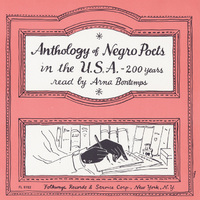 Anthology of Negro Poets in the U.S.A.—200 Years (Audio recording)
Anthology of Negro Poets in the U.S.A.—200 Years (Audio recording)
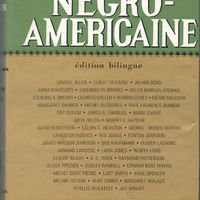 La Poésie Négro-Américaine: Anthologie
La Poésie Négro-Américaine: Anthologie
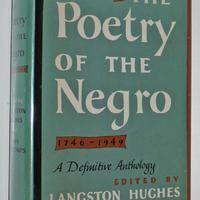 Front cover and spine (1949 ed.)
Front cover and spine (1949 ed.)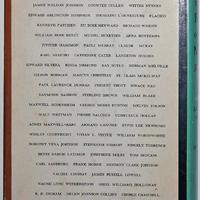 Back cover (1949 ed.)
Back cover (1949 ed.)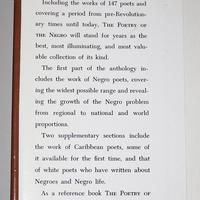 Front flap dust jacket (1949 ed.)
Front flap dust jacket (1949 ed.)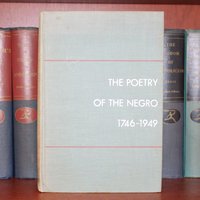 Front cover sans dust jacket (1949 ed.)
Front cover sans dust jacket (1949 ed.)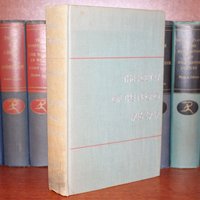 Front cover and spine sans dust jacket (1949 ed.)
Front cover and spine sans dust jacket (1949 ed.)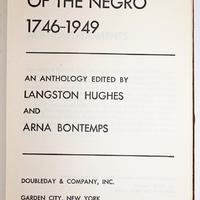 Title page (1949 ed.)
Title page (1949 ed.)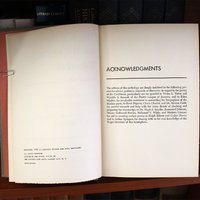 Copyright page and acknowledgments page (1949 ed.)
Copyright page and acknowledgments page (1949 ed.)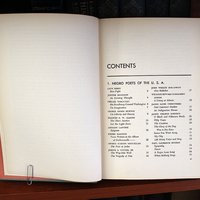 Table of contents 1 (1949 ed.)
Table of contents 1 (1949 ed.)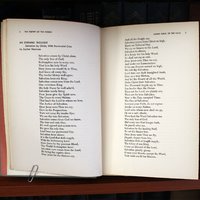 Sample page image (pp. 4-5) (1949 ed.)
Sample page image (pp. 4-5) (1949 ed.)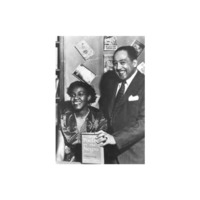 Gwendolyn Brooks and Langston Hughes, promoting the anthology, Chicago, 1949
Gwendolyn Brooks and Langston Hughes, promoting the anthology, Chicago, 1949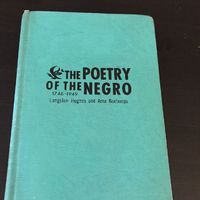 Front cover (school edition?)
Front cover (school edition?)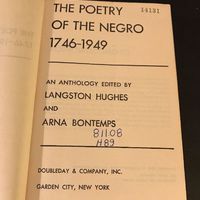 Title page (school edition?)
Title page (school edition?)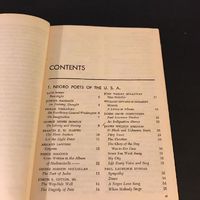 Table of contents 1 (school edition?)
Table of contents 1 (school edition?)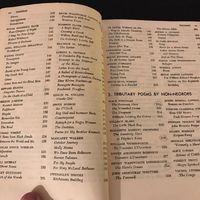 Table of contents 2 (school edition?)
Table of contents 2 (school edition?)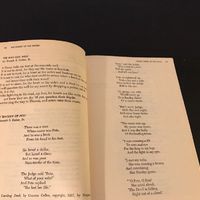 Sample page image (pp. 14-15)
Sample page image (pp. 14-15)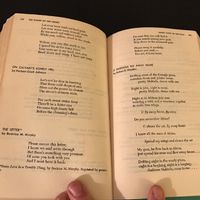 Sample page image (pp. 162-163)
Sample page image (pp. 162-163)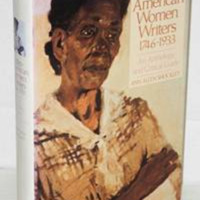 Afro-American Women Writers, 1746-1933: An Anthology and Critical Guide
Afro-American Women Writers, 1746-1933: An Anthology and Critical Guide The Poetry of the Negro, 1746-1970 (rev. ed.)
The Poetry of the Negro, 1746-1970 (rev. ed.)














